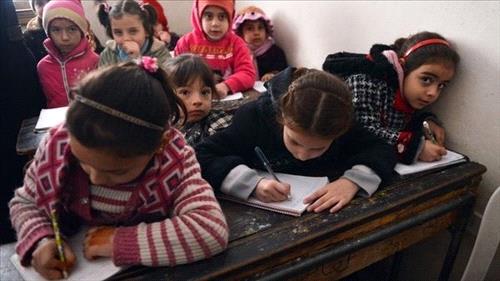Ammon News - LONDON (Reuters) - More than a fifth of Syria's schools have been destroyed or made unusable in more than two years of conflict, jeopardising the education of 2.5 million young people, Save The Children aid agency reported on Friday,
The civil war in Syria has contributed to a sharp increase over the past year in the number of violent incidents affecting children's education reported worldwide, the agency said.
More than 70 percent of 3,600 such incidents in 2012 occurred in Syria, where school buildings were shelled, teachers attacked and children recruited into armed groups, it added.
Save The Children said it had stepped up its monitoring due to Syria's worsening crisis and concerns over girls' access to education in parts of South Asia and sub-Saharan Africa.
The report includes new UNESCO research showing that 48.5 million children living in conflict areas across the world are out of school, more than half of them of primary school age.
Save The Children said an estimated 3,900 schools in Syria had been destroyed or put out of action by January 2013.
"But more recent estimates in April a very rapid increase in this number, with 22 percent of the country's 22,000 schools rendered unusable," it said.
"The combined effects of conflict have jeopardised the education of 2.5 million school-age children and young people."
"APPALLING CRIMES"
Save the Children Chief Executive Jasmine Whitbread said in a statement accompanying the report: "The classroom should be a place of safety and security, not battlegrounds where children suffer the most appalling crimes. Children who are targeted in this way will be paying the price for the rest of their lives."
The report called for more humanitarian aid to be spent on schooling, saying the Syrian education sector had requested $45 million in January from the U.N. Syria Humanitarian Assistance Response Plan but had only received $9 million by June.
Levels of funding for education in humanitarian emergencies in general remained "shockingly low".
Education, the report said, had fallen to 1.4 percent of overall humanitarian funding last year from 2 percent in 2011, below the 4 percent global target set in 2010.
It urged world leaders to protect education by increasing funding, criminalising attacks on education, prohibiting the use of schools by armed groups and by working with schools and communities to adopt local measures to preserve schools as centres for learning, especially in times of conflict.
The report was timed to coincide with an appearance later on Friday by Pakistani schoolgirl Malala Yousafzai at the U.N. General Assembly for her first public speech since gunmen attacked her on her way to school in Pakistan in October.
